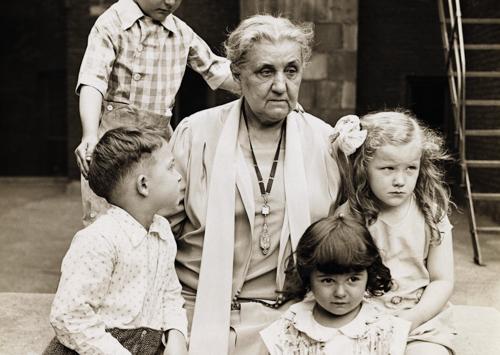Alexander Sutherland Neill discusses lying to children
BROADCAST: 1963 | DURATION: 00:04:57
Synopsis
Alexander Sutherland Neill says no one should ever lie to a child because children are brutally honest. Neill says people tend to live their lives as a lie. Neill also points out that when someone comes knocking at the door, and one tells the child to tell that person that so and so is not home, adults are teaching their children about white lies. This is a very short interview that ends abruptly.
Transcript
Tap within the transcript to jump to that part of the audio.
Alexander Sutherland Neill spanked me. My father broke a plate at the next meal and she smiled and I thought, "Hold on, there's something wrong here." You see, there's something unjust. It was a lie and, well, I don't know. It's difficult to say it pretty concretely but every child knows when his mother and father are lying, are not always-- are not telling the truth. "Oh, Johnny, if that's Mrs. Smith at the door, tell her I'm not at home."
Studs Terkel Yeah.
Alexander Sutherland Neill And that sort of thing and children get that all along. And children are frightfully honest themselves, I mean, in- inately, they hate that, they don't like lying. They like they like to be absolutely down the line. I think that's one great thing about childhood. Lying in a child is put into him, its not natural. A lot of children, for example, lie but they don't lie nearly so much as older people. A kid will come and say to me, "I've broken a window" but, he might not go and say it to his father.
Studs Terkel You said in your book that you had-- you have never lied to a child in the 40 years at the school?
Alexander Sutherland Neill Did I say that? Oh, well, that's slightly-- I think that's possibly true in main things, yes. I've never lied to a child in-- Oh, yes, I have. I lied, I I don't know if it's in the book or not, a problem girl, one time, was accused of stealing a pound. She had been seen spending a pound and at the public meeting at which she was charged she said I got the pound from Neill and the chairman asked me and I had lied. I said, yes, I gave her the pound. But I knew that if I had went against her, I could never help her psychological issue. I'd be her enemy, you see? I'd be classed with all the people who'd let them down in the past. And that was a legitimate lie. But I expect-- I expect if I'm busy digging a hole somewhere and the kid comes and says, "You got any nails?" I say, hold on, I'm I'm I guess possibly I have, well, I don't mind things like that. Little lies. To tell white lies is human, we all do. But to live a lie is unpardonable, to put it that way.
Studs Terkel To live a lie. In this case, the case you're describing, sounds like a very natural logic leap for you. You seek to help this girl, you do. I think this phrase you mention to- to live a lie.
Alexander Sutherland Neill Well, most people, so many people, live a lie. They live their [ideal colleagues? ideal at college?] and husbands and wives keep calling each other darling, and everybody knows it, that they're not loving each other at all and they're living the lie that they're going to church on Sunday and worshipping God and an awful lot of people are living lies. They're living lies. I don't know. [It is a whole civilization?] The [whole?] of advertising is a lie in some in [literally? little?]
Studs Terkel Mr.Neill, let's talk a little about the school itself? Now we hear the word authority, so, well, you say, in the 19th century there was overt authority. You do this or I will whip you, whatever it is, and then there's the authority that's somewhat different. The the the--
Alexander Sutherland Neill Subtle
Studs Terkel The subtle authority says, "You will like this very much; do
Alexander Sutherland Neill That's that's unpardonable. That's worse than the other. That's worse than the other that sort of thing, you know, Mummy mummy would like you to do this or Mummy's got a headache, you be quiet. That sort of thing is unpardonable. The old way had something. It wasn't good but, at least it was honest. If you don't do this, I'll beat you. But the other way, 'No, Johnny, I think you'd like to do this.' And it's it's suggestion on a large scale. A tremendous lot of so-called progressive schools go in for this, the suggestion. The suggestion that Beethoven is more important than the latest jazz. He may be but it's a part of the child's education to discover that for himself not to be told. That's where the that molding of character. You have it all over the place.
Studs Terkel I remember, in one case, in in in one part of the book there you you had a liking for Beethoven or somethi-- and the kids w-- they were playing Presley. Now you didn't tell them 'you must like Beethoven.'
Alexander Sutherland Neill Oh no, I don't do that, of course not. Mind you, the ideal thing would be to [to chin up and have a place for?] [unintelligible] for childhood of all sorts of choices. I mean, I can't afford a music teacher. I had one for nine years, a girl from Vienna, she was very good. [But we could no longer afford her and] she had to go, she was too good for us. And that's the point, you see, if you're going to run a free school you should have a




